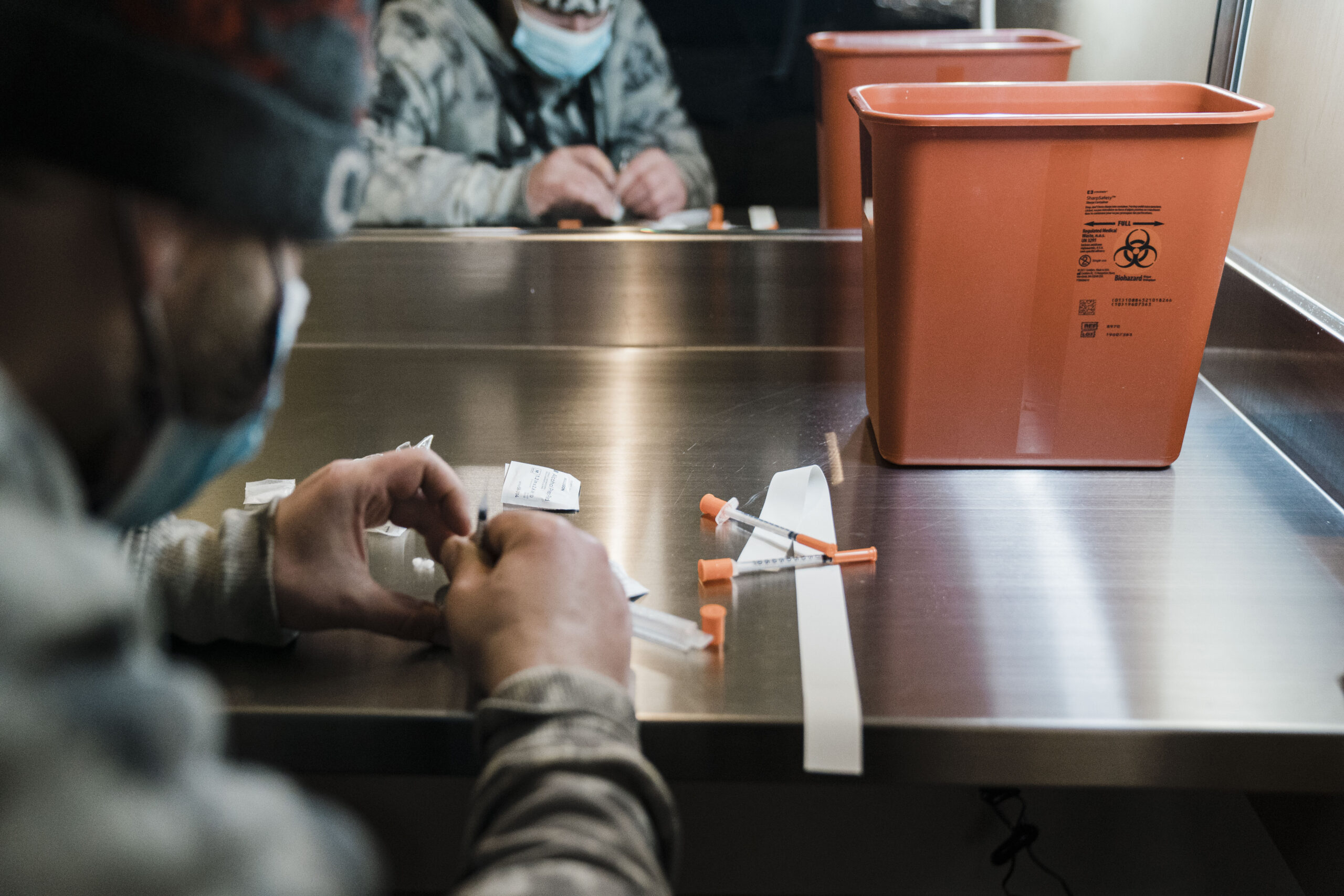San Francisco officials have long pointed to two novel drug treatment centers in New York City as an example of what could be done locally to combat record-high drug overdoses.
But those centers—safe-consumption sites that allow people to use drugs under supervision—appear to be under fresh scrutiny from the federal government, the New York Times reported Tuesday. Safe-consumption sites are illegal under federal law, but a nonprofit called OnPoint received the blessing of local authorities to operate the sites using private financing.
Damian Williams, U.S. attorney for the Southern District of New York, told the paper Monday that until the sites are authorized in the state, they violate the law. “My office is prepared to exercise all options—including enforcement—if this situation does not change in short order,” he said.
The stern message from a top appointee of President Joe Biden has cast fresh doubts on the idea that the federal government will carve out a legal lane for the controversial sites anytime soon—and may play a role in San Francisco’s approach to safe-consumption sites.
“There are legal risks that go along with this,” Supervisor Matt Dorsey said. “A more amenable Biden administration could give cities cover on this, and I think there was hope in the Philadelphia case that they would give some guidance.”
For years, the U.S. Department of Justice and a Pennsylvania-based nonprofit called Safehouse have been entangled in litigation over a safe consumption site in Philadelphia, another city ravaged by fatal overdoses. Proponents of safe-consumption sites had been hoping that a settlement in the case would establish guidelines for the sites to operate legally, but there is “at present no prospect of a settlement,” a judge overseeing the case wrote on July 25.
Legal Risks
Williams’ message—and the prospect of a Republican winning the White House in 2024—have fueled worries that allowing a safe-consumption site to operate in San Francisco could expose city employees to criminal prosecution in the future.
“It’s no joke when we’re talking about things like criminal statutes,” Dorsey said.
Those worries aren’t entirely without precedent.
When Joe Russoniello, a George W. Bush appointee, served as U.S. attorney for the Northern District of California, he raised the specter of criminally charging city employees over improper handling of juvenile arrestees who were undocumented. No employees were charged in the end, however.
Supervisor Hillary Ronen, a leading advocate in City Hall for safe-consumption sites, told The Standard she was concerned over what Williams’ comments could mean for nonprofits hoping to open safe-consumption sites.
“We’re going to have an overdose prevention center in this country at some point,” Ronen said. “The question is: When are politicians going to get out of the way?”
Lydia Bransten, executive director of a nonprofit called the Gubbio Project, which hopes to open a safe-consumption site in the Mission, told The Standard she hopes Williams’ comments will push New York legislators to create a pathway for the sites to operate legally.
Last year, Gov. Gavin Newsom added another legal stumbling block when he vetoed a bill that would have allowed San Francisco and other cities to operate safe-consumption sites under state law.
“New York and San Francisco are two different places,” Bransten said. “But my hope is that this ends in New York legalizing safe consumption sites, which would lay the groundwork and be helpful for all the other cities trying to do this lifesaving work.”
San Francisco’s budget funds so-called “wellness hubs,” or sites that connect people with drug addiction with health resources, including harm-reduction supplies, medical care and basic humanitarian services. Mayor London Breed’s budget, unveiled in June, initially indicated that the sites could include safe-consumption services funded through private dollars.
But Dorsey said in a press release last week that the city’s Department of Public Health excluded safe-consumption services from its plans to open a wellness hub in his district, leading him to revoke his support for the facility.
The health department didn’t respond to multiple requests for comment on the details of the planned wellness hubs.
“Our office’s perspective on this topic has not changed,” said Alex Barrett-Shorter, a spokesperson for the City Attorney’s Office, which has cautioned against using city funds for safe-consumption sites. “We will continue to closely monitor any developments in the law, as well as await anticipated guidelines from the federal government on how local governments can operate overdose-prevention programs in compliance with federal law.”
War of Words
The legal ambiguity hasn’t stopped local elected officials from trading barbs over the city’s approach to the drug overdose crisis.
Safe-consumption sites have been the subject of local debates over how best to fund them, along with their efficacy in helping drug users and improving conditions on the streets. Often underpinning those debates are diverging philosophies about whether to prioritize voluntary services or use law enforcement to coerce people into treatment.
Dorsey, who supports safe-consumption sites as well as stricter police crackdowns on public drug use, urged Mayor London Breed last week to reallocate $19 million budgeted for wellness hubs to fund substance use treatment offered through San Francisco jails.
The city has ramped up drug arrests in recent months, citing and detaining people using drugs in public in an effort to discourage the behavior and steer people with addiction into services.
Dorsey said it doesn’t make sense to open a “half-baked” wellness hub that provides harm-reduction supplies at a time when the city is cracking down on drug use, saying the money is better spent on jail programs.
But Ronen’s office slammed Dorsey for reversing his support for wellness hubs, accusing him of “moving the goalposts” and stalling progress on overdose prevention. Ronen said that local nonprofits had been gearing up to fund the safe-consumption services within the wellness hubs by using private dollars and contended that plans for the sites haven’t changed.
“It’s time to put peoples’ lives over politics on this issue,” Ronen said.
